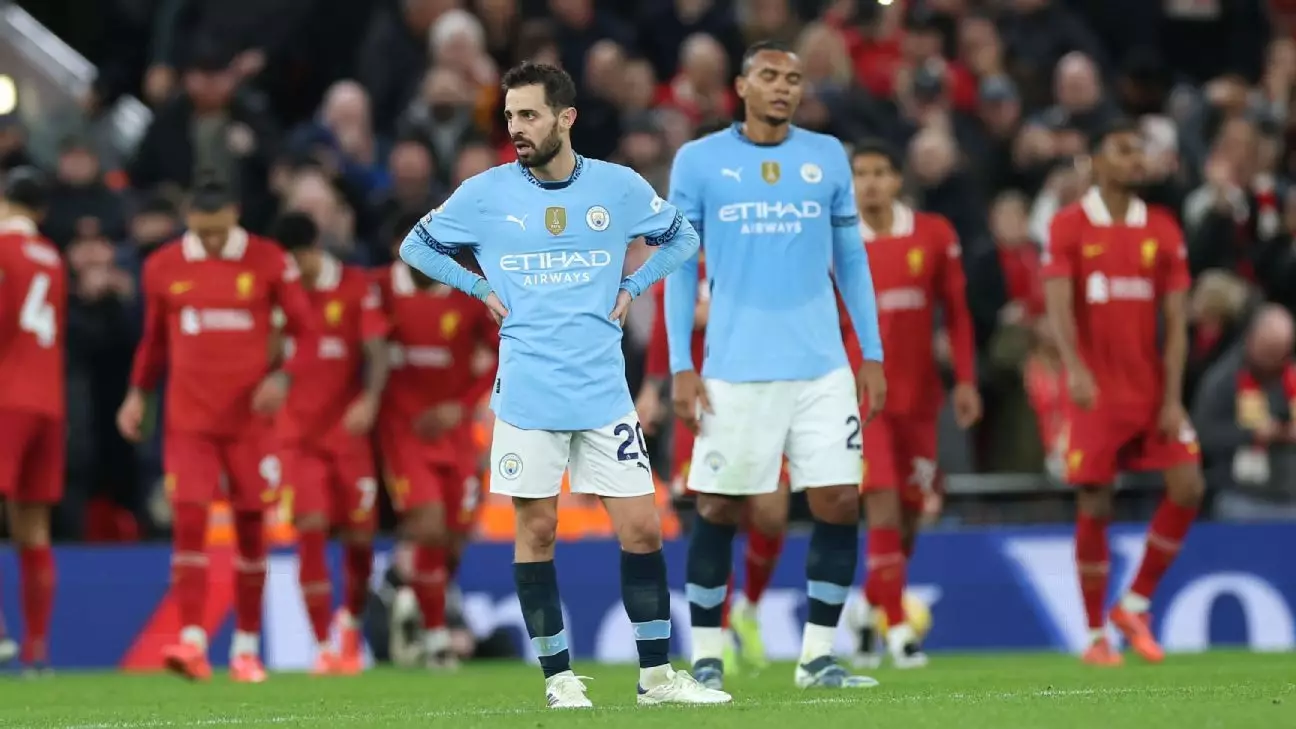The narrative surrounding Manchester City has taken a decisive turn, indicating that we may already be witnessing the decline of one of football’s most dominant forces. Often, the downfall of an exemplary team is greeted with resistance, as supporters and analysts cling to the past glories, hoping those achievements will somehow promise a seamless transition into continued success. However, the stark reality is that the glorious past serves as a fragile crutch, and with each passing season, the foundation can weaken further. For City, under Pep Guardiola’s stewardship, this sentiment is particularly poignant.
As City stumbled to a 2-0 loss against Liverpool—marking their sixth defeat in seven matches—it became painfully evident that the club is trapped in a cycle all too familiar for footballing giants. The plight of Manchester United after Sir Alex Ferguson’s retirement serves as a cautionary tale. United was left grappling with the shadow of former glory for over a decade, unable to reclaim its stature as a dominant club. Similarly, Liverpool suffered through a prolonged struggle after their powerful 1980s reign. Both teams failed to realize that past success does not inherently guarantee future victories; complacency can usher in decline.
During their recent encounter at Anfield, Manchester City appeared a shadow of the invincible squad that had claimed six league titles in seven seasons. Players such as İlkay Gündoğan, Natán Aké, and Kyle Walker illustrated the issues that often herald the decline of great teams. Aging athletes, coupled with poor recruitment strategies, create a brew that can be detrimental to any club’s prospects. The most successful teams rejuvenate their lineup regularly, blending the energy of emerging stars with seasoned veterans.
The glaring mistakes made in recruitment reflect a disturbing trend. City’s choices echo the errors of both Manchester United and Liverpool, who once allowed their legendary teams to age without establishing effective succession plans. Recent signings like Matheus Nunes seem uninspired, while the once-lauded Gündoğan has been unable to replicate his prior form.
With injuries to key players like Rodri sidelining them, Gündoğan found himself taking on a larger role than anticipated, indicating how dire the situation has become. The midfield pairing of Gündoğan and Nunes highlighted City’s waning strength. The combination of their respective skill sets cannot match the caliber of players who once roamed the Etihad’s green pastures.
Consequences of Poor Decisions
In the struggle between past successes and present realities, City is beginning to pay for the choices made in the transfer market. The specter of off-field challenges surrounding financial regulations has undoubtedly skewed decisions made within the club. In a desperate attempt to maintain momentum, Manchester City’s leadership has resorted to making risky moves, such as the controversial re-signing of Gündoğan—despite his advancing age and declining pace.
This series of shortsighted decisions parallels the misjudgments that plagued Manchester United’s attempts to replace iconic players. The club’s ill-fated long-term replacements for players such as Rio Ferdinand serve as a reminder of the pitfalls around inadequate succession planning. Likewise, City has seen the departures of promising youngsters such as Cole Palmer and Raheem Sterling, each of whom could have played pivotal roles in rejuvenating the squad.
As players age and recoveries from injuries grow less reliable, City must contend with the increasing risk of entering freefall. The gradual erosion of the team’s youthful exuberance serves as a clarion call for urgent action, but the club seems caught in a web of its making, unable to pivot toward a brighter future.
Although it feels alarming to watch City’s impressive run give way to uncertainty, the reality is often more gradual. The loss to Liverpool wasn’t a singular catastrophe but rather symptomatic of the club’s ongoing struggles that have been swirling beneath the surface. Current results against teams like Bournemouth, Brighton, and Tottenham only serve to reinforce the notion that City is no longer an impenetrable fortress on the pitch.
Despite the ominous signs, it is crucial to acknowledge that City may still find success this season. However, their transformation from a formidable force to a team that no longer commands respect suggests a troubling trajectory. As they grapple with the consequences of their decisions, the question remains: can they effectively transition toward a new chapter before it’s too late? History has often shown us that the best teams adapt; if City fails to do so, they may become another poignant chapter in the annals of footballing history, reminding us that greatness, once lost, is not easily regained.

